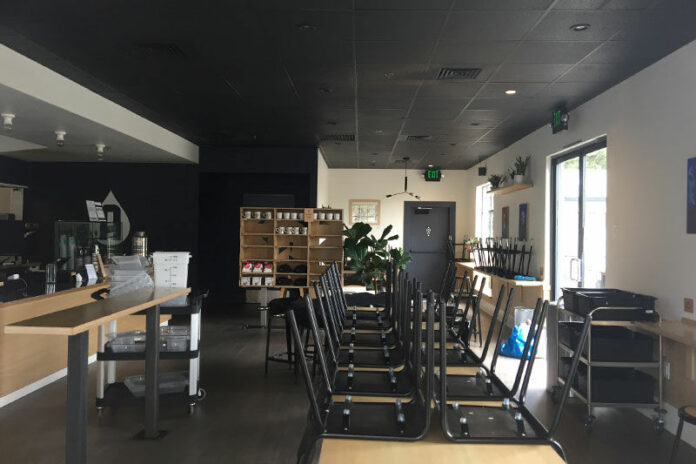
Sonoma County’s private businesses come in all shapes and sizes. But none of them are either too big or too small to avoid the economic impacts of the ongoing public health emergency caused by the spread of the COVID-19 virus and the resulting global pandemic.
As with the wildfires and forced power outages from recent years, local business owners and their employees know they will be losing money and maybe jobs. No one knows if this viral attack will be worse than a wildfire or not as bad as a flood. But there already have been more closed businesses, canceled events and government shutdowns than during the wildfires of 2017 and the floods and power shutoffs of 2019. At a national level, some financial experts are suggesting the whole country may be headed into a depression, deeper than the 2008 Great Recession.
The bad economic news here started with a trickle of event cancellations, such as the second weekend of the Wine Road’s Barrel Tasting. That and other postponed events triggered mass inn and hotel room cancelations. Then, Gov. Gavin Newsom last weekend ordered all California bars and wine tasting rooms to close until further notice, which basically hung a “closed for business” sign on the entire Sonoma County wine country.
The economic impact of a shutdown of this magnitude is difficult to calculate this early on.
“It’s going to be unprecedented. I think we’re all going to agree on that,” said Ethan Brown, director of business development for the Sonoma County Economic Development Board. “We don’t know where the peak of this is, and given that it’s not behind us right now, it’s hard to know exactly what’s going to be measured.”
Brown said that right now, the Economic Development Board is primarily focusing on helping disseminate health information, but that it’s also maintaining a list of resources for local businesses on its website, sonomaedb.org /Business-Assistance/Business-Assistance-Coronavirus.
Although still operating on a regular schedule at press time, commercial flights into the county’s Charles M. Schulz Airport were landing with mostly empty seats. A recent flight had only 12 passengers aboard, an airport employee said.
“Healdsburg lodging properties have seen a significant increase in cancellations over the last few days, with many travelers either unable to come to Healdsburg or uncomfortable traveling to the destination during this time of uncertainty,” said Holly Fox, chair of Healdsburg Lodging Association and the Healdsburg Tourism Improvement District (HTID.) The loss of booked rooms will impact local governments’ receipt of TOT — Transient Occupancy Tax — for months to come.
Prior to closing, most area wineries had voluntarily closed their public tasting rooms, similar to many restaurants offering only pick-up or to-go meals.
Alan Baker, owner of Cartograph Wines in Healdsburg, said he is offering free shipping since many people are now under “shelter in place” rulings.
“We had been restricting the size of tasting groups and added hand-washing stations, and we were sanitizing each location after guests as well, as alcohol sanitization,” Baker said.
He will now get busy with some extra “spring cleaning” while he waits out the local wave of COVID-19 economic impacts.
All area grocery, drug and department stores had their toilet paper stocks depleted early in the coronavirus epidemic. Hand sanitizer supplies became as precious as gold, and N95 and surgical masks were being rationed at local healthcare facilities. Big John’s Market owner Kim Lloyd said her suppliers have pledged to continue regular grocery, produce and other deliveries, but some warned that the Bay Area’s large warehouse inventories were starting to deplete.
Along the lower Russian River, visitor traffic has noticeably slowed just when the winter weather was actually very inviting.
“We are still waiting for updates from the various properties, but it’s noticeable,” Russian River Chamber executive director Karin Moss said of the decline in business. “But this is a very caring community which has come together in dire circumstances again and again, and I have witnessed firsthand how people care and respect one another. Never forget, we are better together.”
While it had to cancel its annual Sidewalk Sales Days this week, the Healdsburg Chamber of Commerce did host a series of teleconferences for members with the Small Business Administration (SBA) and the United States Chamber of Commerce. So far, any specific business loss coverage or disaster relief support is still being examined, awaiting pending U.S. Congressional approval on nationwide stimulation packages, no-interest loans or disaster relief grants. (See article at left about an economic disaster loan available from the SBA.)
Several local businesses and business groups were asking local “at home” shoppers to purchase gift cards or make online purchases from local businesses to help support the local economy.
DragonFly Floral of Healdsburg was urging local people to send flowers to friends and neighbors to support their business, which is suffering from canceled weddings and events.
In Sebastopol, the city and local business groups are brainstorming how to help local businesses there.
“We’re working with the Sebastopol Downtown Association and the Chamber to develop a plan to support local businesses through this economic disaster,” Sebastopol Councilmember Michael Carnacchi said. “We’ll release more details as soon as they become available.”








